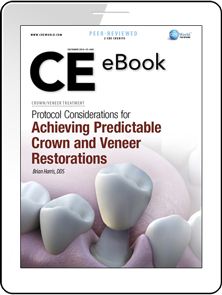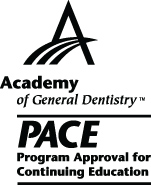CDEWorld > eBooks > Protocol Considerations for Achieving Predictable Crown and Veneer Restorations


ADA CERP is a service of the American Dental Association to assist dental professionals in identifying quality providers of continuing dental education. ADA CERP does not approve or endorse individual courses or instructors, nor does it imply acceptance of credit house by boards of dentistry. Concerns or complaints about a CE provider may be directed to the provider or to ADA CERP at www.ada.org/cerp/

Approved PACE Program Provider. FAGD/MAGD credit. Approval does not imply acceptance by a state or provincial board of dentistry, or AGD endorsement. 1/1/2023 to 12/31/2028. ID # 209722.
eBook
Released: Tuesday, December 6, 2016
Expires: Tuesday, December 31, 2019
Protocol Considerations for Achieving Predictable Crown and Veneer Restorations
By Brian Harris, DDS
Commercial Supporter: Kerr Corporation
Several factors affect the long-term success of crown and veneer treatments, including tooth preparation, impression-taking, and provisionalization. Cementation protocol and the materials used are also considerations to ensure predictable treatment outcomes. As new materials and techniques are introduced on an ongoing basis, dentists may at times be unsure about what works best under different circumstances. This article discusses the requisite clinical protocol involved with crown and veneer restorations that should be considered and envisioned prior to initiating treatment.
LEARNING OBJECTIVES:
-
Describe a typical crown preparation protocol.
-
Identify factors that contribute to accurate and detailed impressions.
-
Discuss considerations for creating provisional restorations.
-
Explain characteristics of available cementation options.
About the Author
Brian Harris, DDS
Private Practice, Phoenix, Arizona


